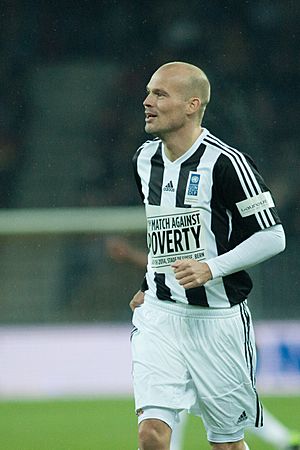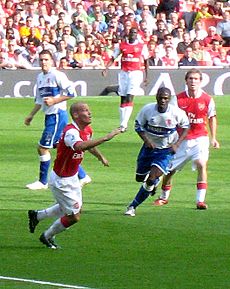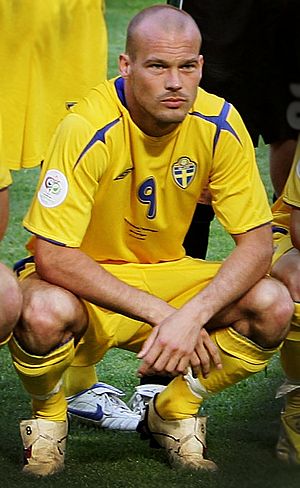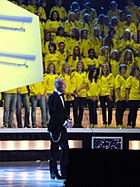Freddie Ljungberg facts for kids

Ljungberg playing in the Match Against Poverty in 2014
|
|||
| Personal information | |||
|---|---|---|---|
| Full name | Karl Fredrik Ljungberg | ||
| Date of birth | 16 April 1977 | ||
| Place of birth | Vittsjö, Sweden | ||
| Height | 1.75 m (5 ft 9 in) | ||
| Position(s) | Winger | ||
| Team information | |||
|
Current team
|
N5 FC (joint-manager with Jens Lehmann and Robert Pires) | ||
| Youth career | |||
| 1982–1994 | Halmstad | ||
| Senior career* | |||
| Years | Team | Apps | (Gls) |
| 1994–1998 | Halmstad | 79 | (10) |
| 1998–2007 | Arsenal | 216 | (46) |
| 2007–2008 | West Ham United | 25 | (2) |
| 2009–2010 | Seattle Sounders FC | 37 | (2) |
| 2010 | Chicago Fire | 15 | (2) |
| 2011 | Celtic | 7 | (0) |
| 2011–2012 | Shimizu S-Pulse | 8 | (0) |
| 2014 | Mumbai City | 4 | (0) |
| Total | 391 | (62) | |
| International career | |||
| 1993 | Sweden U16 | 4 | (2) |
| 1994 | Sweden U18 | 8 | (1) |
| 1995–1998 | Sweden U21 | 12 | (5) |
| 1998–2008 | Sweden | 75 | (14) |
| Managerial career | |||
| 2016–2017 | Arsenal U15 | ||
| 2018–2019 | Arsenal U23 | ||
| 2019 | Arsenal (caretaker) | ||
| 2025– | N5 FC (joint-manager) | ||
| *Club domestic league appearances and goals | |||
Freddie Ljungberg (born April 16, 1977) is a Swedish former professional footballer. He played as a winger, which means he ran along the sides of the field. He also worked as a coach, including being an assistant coach and temporary head coach for Arsenal.
Freddie started his football journey at Halmstad in Sweden. He spent most of his playing career at Arsenal, a famous English club. There, he helped the team win many important trophies. These included two Premier League titles and three FA Cups. He even scored goals in two FA Cup finals, including the winning goal in 2002.
After leaving Arsenal in 2007, he played for several other clubs. These included teams in England, Scotland, the United States, Japan, and India. Freddie also played for the Swedish national team for ten years. He played in major tournaments like the UEFA European Championships (Euro 2000, 2004, 2008) and the FIFA World Cups (2002, 2006). He was the captain of Sweden from 2006 until he retired from international football after Euro 2008.
Outside of football, Ljungberg was also a model for Calvin Klein underwear. He also worked with other big brands like Nike and Pepsi.
Contents
Early Life and Youth Football
Freddie Ljungberg was born on April 16, 1977, in Vittsjö, Sweden. His father, Roy, owned a construction business. His mother, Elisabeth, worked for the Swedish Labor Department. In 1982, his family moved to Halmstad.
When Freddie was five, he started playing football for the youth team at Halmstads BK. His coach, Olle Eriksson, saw that Freddie was very talented. He also noticed that Freddie was kind to other players. He would pass the ball so his friends could score goals too. Freddie also enjoyed playing ice hockey and handball as a child. He was even good enough to be called up to the national under-15 handball team. But he decided to focus only on football.
Freddie was also a good student in school. When he was 18, he started university to study information technology and economics. However, it was hard to balance his studies with professional football. So, he decided to leave university to focus on his football career.
Club Career Highlights
Starting at Halmstad
In 1989, when Freddie was 12, he convinced Halmstads BK to let him play with older players. This was unusual for the club at the time. Three years later, he joined the senior team.
Freddie played his first senior game on October 23, 1994. In 1995, he scored his first professional goal. That same year, Halmstad won the Swedish Cup. In 1997, Halmstad won the Swedish league, the Allsvenskan. Freddie scored and assisted many goals that season. He played 139 games for Halmstad, scoring 16 goals. After his success, big clubs like Barcelona and Arsenal became interested in him.
Becoming an Arsenal Star

Arsenal signed Ljungberg in 1998 for £3 million. Arsenal's manager, Arsène Wenger, decided to sign him after watching him play for Sweden against England on TV. Freddie quickly showed his talent. He scored in his very first game for Arsenal on September 20, coming on as a substitute against Manchester United. Arsenal won that game 3–0.
In the 2001–02 season, Freddie played a huge part in Arsenal winning both the Premier League and the FA Cup. This is called winning the "Double." He scored in many games, including a fantastic goal in the 2–0 FA Cup Final win against Chelsea. He scored 17 goals in all competitions that season. He was also the first player in 40 years to score in two FA Cup Finals in a row.
In the 2002–03 season, Freddie helped Arsenal reach another FA Cup final. He scored the winning goal in the semi-final. Arsenal then beat Southampton in the final. Freddie also scored his first "hat-trick" (three goals in one game) for Arsenal in a 4–0 win against Sunderland.
In the 2003–04 season, Arsenal had an amazing year. They went the entire league season without losing a single game! This team is known as "The Invincibles." Freddie played in 30 league games that season. He scored the winning goal against rivals Tottenham Hotspur. The next season, 2004–05, he played in his fourth FA Cup final. Arsenal won by beating Manchester United in a penalty shootout.
Freddie was great at playing as a winger on either side of the midfield. He was a key player for Arsenal for many seasons. He was part of the team's incredible 49-game unbeaten run. He sometimes had problems with injuries and severe headaches. In 2006, he played in the Champions League Final against Barcelona, even though he had an ankle injury.
His last game for Arsenal was on April 21, 2007, against Tottenham Hotspur. He had to leave the game early due to an injury. In 2008, Arsenal fans voted him as one of the club's greatest 50 players.
Moving to West Ham United
On July 23, 2007, after nine years at Arsenal, Freddie joined London rivals West Ham United. He signed a four-year contract. He played his first game for West Ham on August 11, 2007. He was even the captain in that match.
Freddie scored his first goal for West Ham on February 9, 2008. He scored again a month later. In his last game of the season, he broke his ribs after another player accidentally fell on him. This injury kept him out for the rest of the season. In June 2008, Freddie decided to retire from the Swedish national team to focus on West Ham. Days later, he agreed to end his contract with West Ham after just one year.
Playing in the USA and Beyond
After leaving West Ham, Freddie took some time off from football. Many people wondered what he would do next. On October 28, 2008, the new Major League Soccer (MLS) team, Seattle Sounders FC, announced they had signed Freddie. He was their "designated player," meaning he was a star player paid more than others.
Freddie had hip surgery in December 2008. He recovered faster than expected. He made his debut for Seattle on March 28, 2009. He scored his first MLS goal on April 4, 2009, against Toronto FC. In July 2009, Freddie was chosen to start for the MLS All-Stars. He was also made captain of the team. He helped Seattle win the U.S. Open Cup in 2009.
On July 30, 2010, Freddie was traded to another MLS club, Chicago Fire. He played 15 games for them. He then announced he would leave Chicago Fire at the end of the 2010 season.
Freddie returned to Europe on December 27, 2010, joining Scottish club Celtic. He signed a contract after a successful trial. He made his debut for Celtic on January 9, 2011.
On September 6, 2011, Freddie signed with Japanese team Shimizu S-Pulse. He left the club in February 2012. On August 24, 2012, Freddie Ljungberg announced his retirement from football.
However, on July 25, 2014, Freddie announced he would make a comeback. He joined Mumbai City in the new Indian Super League. But due to ongoing back problems, he only played four games. He then decided to end his contract and return home.
International Career for Sweden
Youth and Senior Debut
In 1996, Freddie made his debut for the Swedish national U-21 team. He scored two goals in his first game against Denmark U21.
He made his senior international debut for Sweden on January 24, 1998, against the United States. He scored his first goal for the national team against Denmark in a 3–0 victory.
World Cups and European Championships
Freddie was part of the Swedish squad for UEFA Euro 2000. He played in all three group games before Sweden was knocked out.
Before the 2002 FIFA World Cup, Freddie had a small disagreement with a teammate during practice. Despite a hip injury, Freddie played in games against England and Nigeria. Sweden advanced from their tough group but were then defeated by Senegal.
Sweden qualified for UEFA Euro 2004. In Sweden's first game, Freddie scored the opening goal in a 5–0 win against Bulgaria. Sweden made it to the next round but lost to the Netherlands.
At the 2006 FIFA World Cup, Freddie had a swollen ankle. Doctors advised him to rest, but he insisted on playing to help Sweden. He scored a late goal in the 89th minute against Paraguay, giving Sweden a 1–0 victory. Sweden advanced to the next round but lost to host nation Germany. For his efforts, Freddie received the Guldbollen award, which is given to Sweden's best male footballer.
After the 2006 World Cup, Freddie became the captain of Sweden. He led the team in many games during the qualifiers for Euro 2008. He scored one goal and had an assist, helping Sweden qualify. Before UEFA Euro 2008, Freddie fractured his ribs. But he still played in the tournament with a special brace. Sweden was knocked out early, but Freddie was seen as their best player.
Retirement from International Play
On June 27, 2008, Freddie announced he was retiring from the Swedish national team. This decision came after Sweden's early exit from UEFA Euro 2008. He played 75 games for Sweden and scored 14 goals.
Coaching Career
Returning to Arsenal
In May 2013, Arsenal announced that Freddie would become a club ambassador. This role involved helping to promote the club around the world. He said he was "honoured" to take on this job.
On July 12, 2016, it was confirmed that he would join the Arsenal Academy to coach the under-15 team.
Coaching at VfL Wolfsburg
In February 2017, Freddie became an assistant coach for VfL Wolfsburg in Germany. He worked there for six months before the coaching staff was changed in September 2017.
Back to Arsenal Coaching
On June 12, 2018, Arsenal announced that Freddie would return as the under-23 coach. Then, on June 5, 2019, he was promoted to Arsenal's first-team coaching staff. On November 29, 2019, Freddie was named the temporary head coach after the previous manager left.
His first game as interim head coach was a 2–2 draw against Norwich City. He got his first and only win as interim coach, beating West Ham United 3-1. When Mikel Arteta became the new head coach, Freddie stayed on as an assistant. On August 22, 2020, Freddie announced he was leaving Arsenal to gain more experience in management.
As of July 2025, Freddie is set to manage one of the 12 teams in the upcoming Baller League UK, a six-a-side football league.
Outside Football Activities
Endorsements and Modeling
Freddie Ljungberg's work as a model gained a lot of attention. In 2003, he signed a contract to be an underwear model for Calvin Klein. This campaign was very successful for the company.
He was also sponsored by the sportswear company Nike. He appeared in Nike commercials, including a big global campaign before the 2002 World Cup. In this ad, called "Secret Tournament," he starred alongside other famous football players.
Personal Life
Freddie Ljungberg usually keeps his personal life private. On June 9, 2014, he married his long-time partner, Natalie Foster. They met in 2007. Natalie is a fan of Arsenal's local rivals, Tottenham Hotspur. They have two children together.
Freddie is also a Global Ambassador for Grassroot Soccer. This organization uses football to help young people learn about health and life skills.
Nicknames
When Freddie played in England, he became known as "Freddie." This nickname is not often used in his home country of Sweden. In Sweden, people usually call him by his birth name, Fredrik. His teammates on the Swedish national team sometimes called him "Ljungan." Early in his time at Arsenal, he was also nicknamed "Kid Vicious" because of his punk hairstyle.
Career statistics
Club
| Club | Season | League | National Cup | League Cup | Continental | Other | Total | |||||||
|---|---|---|---|---|---|---|---|---|---|---|---|---|---|---|
| Division | Apps | Goals | Apps | Goals | Apps | Goals | Apps | Goals | Apps | Goals | Apps | Goals | ||
| Halmstad | 1994 | Allsvenskan | 1 | 0 | — | — | — | — | 1 | 0 | ||||
| 1995 | Allsvenskan | 16 | 1 | — | — | 4 | 0 | — | 20 | 1 | ||||
| 1996 | Allsvenskan | 20 | 2 | — | — | 3 | 0 | — | 23 | 2 | ||||
| 1997 | Allsvenskan | 24 | 5 | — | — | 4 | 1 | — | 28 | 6 | ||||
| 1998 | Allsvenskan | 18 | 2 | — | — | 2 | 0 | — | 20 | 2 | ||||
| Total | 79 | 10 | — | — | 13 | 1 | — | 92 | 11 | |||||
| Arsenal | 1998–99 | Premier League | 16 | 1 | 3 | 0 | 2 | 0 | — | — | 21 | 1 | ||
| 1999–2000 | Premier League | 26 | 6 | 2 | 0 | — | 14 | 2 | — | 42 | 8 | |||
| 2000–01 | Premier League | 30 | 6 | 5 | 1 | — | 13 | 2 | — | 48 | 9 | |||
| 2001–02 | Premier League | 25 | 12 | 5 | 2 | — | 9 | 3 | — | 39 | 17 | |||
| 2002–03 | Premier League | 20 | 6 | 4 | 1 | — | 8 | 2 | — | 32 | 9 | |||
| 2003–04 | Premier League | 30 | 4 | 4 | 4 | — | 9 | 2 | — | 43 | 10 | |||
| 2004–05 | Premier League | 26 | 10 | 6 | 2 | — | 6 | 2 | — | 38 | 14 | |||
| 2005–06 | Premier League | 25 | 1 | 1 | 0 | 1 | 0 | 9 | 1 | — | 36 | 2 | ||
| 2006–07 | Premier League | 18 | 0 | 3 | 1 | — | 5 | 1 | — | 26 | 2 | |||
| Total | 216 | 46 | 33 | 11 | 3 | 0 | 73 | 15 | — | 325 | 72 | |||
| West Ham United | 2007–08 | Premier League | 25 | 2 | 1 | 0 | 2 | 0 | — | — | 28 | 2 | ||
| Seattle Sounders FC | 2009 | Major League Soccer | 22 | 2 | 1 | 0 | 2 | 0 | — | — | 25 | 2 | ||
| 2010 | Major League Soccer | 15 | 0 | — | — | — | — | 15 | 0 | |||||
| Total | 37 | 2 | 1 | 0 | 2 | 0 | — | — | 40 | 2 | ||||
| Chicago Fire | 2010 | Major League Soccer | 15 | 2 | — | — | — | — | 15 | 2 | ||||
| Celtic | 2010–11 | Scottish Premier League | 7 | 0 | 1 | 0 | — | — | — | 8 | 0 | |||
| Shimizu S-Pulse | 2011 | J.League | 8 | 0 | — | — | — | — | 8 | 0 | ||||
| Mumbai City | 2014 | Indian Super League | 4 | 0 | — | — | — | — | 4 | 0 | ||||
| Career total | 391 | 62 | 36 | 11 | 7 | 0 | 86 | 16 | — | 520 | 89 | |||
International
| National team | Year | Apps | Goals |
|---|---|---|---|
| Sweden | 1998 | 6 | 1 |
| 1999 | 7 | 1 | |
| 2000 | 8 | 0 | |
| 2001 | 9 | 0 | |
| 2002 | 5 | 0 | |
| 2003 | 4 | 1 | |
| 2004 | 10 | 4 | |
| 2005 | 7 | 5 | |
| 2006 | 8 | 1 | |
| 2007 | 6 | 1 | |
| 2008 | 5 | 0 | |
| Total | 75 | 14 | |
- Scores and results list Sweden's goal tally first, score column indicates score after each Ljungberg goal.
| No. | Date | Venue | Cap | Opponent | Score | Result | Competition | Ref. |
|---|---|---|---|---|---|---|---|---|
| 1 | 28 May 1998 | Malmö Stadion, Malmö, Sweden | 3 | 1–0 | 3–0 | Friendly | ||
| 2 | 31 March 1999 | Stadion Śląski, Chorzów, Poland | 8 | 1–0 | 1–0 | UEFA Euro 2000 qualifying | ||
| 3 | 7 June 2003 | Stadio Serravalle, Serravalle, San Marino | 37 | 3–0 | 6–0 | UEFA Euro 2004 qualifying | ||
| 4 | 14 June 2004 | Estádio José Alvalade, Lisbon, Portugal | 41 | 1–0 | 5–0 | UEFA Euro 2004 | ||
| 5 | 4 September 2004 | Ta' Qali National Stadium, Ta' Qali, Malta | 46 | 4–0 | 7–0 | 2006 FIFA World Cup qualification | ||
| 6 | 6–0 | |||||||
| 7 | 9 October 2004 | Råsunda Stadium, Stockholm, Sweden | 48 | 1–0 | 3–0 | 2006 FIFA World Cup qualification | ||
| 8 | 9 February 2005 | Stade de France, Paris, France | 50 | 1–0 | 1–1 | Friendly | ||
| 9 | 26 March 2005 | Vasil Levski National Stadium, Sofia, Bulgaria | 51 | 1–0 | 3–0 | 2006 FIFA World Cup qualification | ||
| 10 | 3–0 | |||||||
| 11 | 4 June 2005 | Ullevi, Gothenburg, Sweden | 52 | 5–0 | 6–0 | 2006 FIFA World Cup qualification | ||
| 12 | 3 September 2005 | Råsunda Stadium, Stockholm, Sweden | 53 | 1–0 | 3–0 | 2006 FIFA World Cup qualification | ||
| 13 | 15 June 2006 | Olympiastadion, Berlin, Germany | 59 | 1–0 | 1–0 | 2006 FIFA World Cup | ||
| 14 | 13 October 2007 | Rheinpark Stadion, Vaduz, Liechtenstein | 68 | 1–0 | 3–0 | UEFA Euro 2008 qualifying |
Managerial statistics
| Team | Nat | From | To | Record | Ref. | ||||
|---|---|---|---|---|---|---|---|---|---|
| P | W | D | L | Win % | |||||
| Arsenal U-23 | 1 July 2018 | 30 June 2019 | 26 | 12 | 7 | 7 | 46.15 | ||
| Arsenal (interim) | 29 November 2019 | 21 December 2019 | 6 | 1 | 3 | 2 | 16.67 | ||
| N5 FC | 24 March 2025 | present | 10 | 1 | 0 | 9 | 10.00 | ||
| Total | 42 | 14 | 10 | 18 | 33.33 | ||||
Honours and Awards
Halmstad
- Allsvenskan: 1997 (Swedish League Title)
Arsenal
- Premier League: 2001–02, 2003–04 (English League Titles)
- FA Cup: 2001–02, 2002–03, 2004–05 (English Cup Titles)
- FA Charity Shield: 1999
Seattle Sounders FC
- U.S. Open Cup: 2009 (US Cup Title)
Individual Awards
- Premier League Player of the Season: 2001–02
- Premier League Player of the Month: April 2002
- ESM Team of the Year: 2001–02
- Guldbollen: 2002, 2006 (Award for Sweden's best male footballer)
- Swedish Midfielder of the Year: 1998, 2001, 2002, 2003, 2004, 2005
- MLS Best XI: 2009 (Best team in the MLS league)
- MLS Player of the Month: October 2009
See also
 In Spanish: Fredrik Ljungberg para niños
In Spanish: Fredrik Ljungberg para niños
 | DeHart Hubbard |
 | Wilma Rudolph |
 | Jesse Owens |
 | Jackie Joyner-Kersee |
 | Major Taylor |



